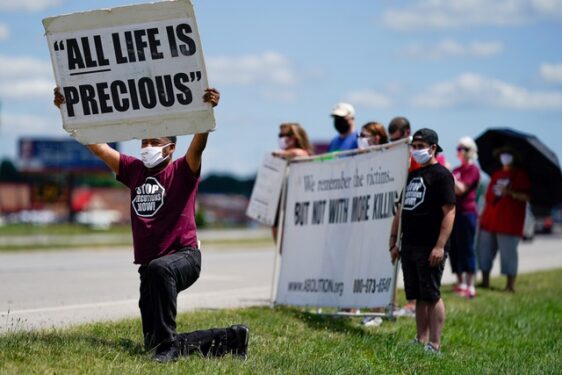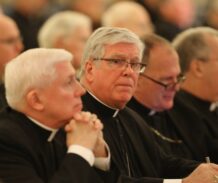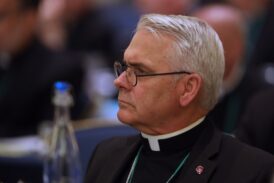
by Bill Miller
WINDSOR TERRACE — In 2003, Lezmond Charles Mitchell received a death sentence after being convicted in a double-murder case.
The victims of that deadly carjacking on the Navajo reservation in Arizona two years earlier were a 9-year-old girl and her 63-year-old grandmother.
Now 38, Mitchell is the only Native American among 58 other death row inmates at the U.S Penitentiary in Terre Haute, Ind. He is scheduled to die by lethal injection on Aug. 26.
Barring any last-minute stays or reprieves, Mitchell will be the fourth federal inmate executed this summer — three occurred in July — with another scheduled for Aug. 28, followed by two more in late September.
While many Catholic bishops insist that the Church must vigorously oppose the death penalty, not all Catholics agree, with almost half not sharing the sentiment.

“You see it in different polls,” said Bishop Frank Dewane of the Diocese of Venice, Florida, who previously chaired the U.S. Conference of Catholic Bishops’ Committee on Domestic Justice and Human Development.
“In my time, I’ve run into people who were not easily swayed,” he said. “So, the Church continually has its work cut out for it.”
Bishop Dewane noted that the U.S. is among a shrinking list of death-penalty nations, including Iran, Iraq, and Saudi Arabia.
“We’re an outlier,” Bishop Dewane said, “and we’re not in the best company.”
More than 70 percent of the world’s countries “have abolished capital punishment in law or practice,” according to the Death Penalty Information Center in Washington, D.C.
But the death penalty has support from President Donald Trump, who recently tweeted about Dzhokhar Tsarnaev, 27, the convicted Boston Marathon bomber, whose death sentence got overturned July 31, because of a judge’s error during the earlier proceedings.
“Ridiculous,” Trump tweeted. “Rarely has anybody deserved the death penalty more than the Boston Bomber, Dzhokhar Tsarnaev. So many lives lost … and ruined. The Federal Government must again seek the Death Penalty in a do-over of that chapter of the original trial. Our Country cannot let the appellate decision stand.”
The office of Boston Cardinal Seán Patrick O’Malley said in a statement that while a new sentencing trial could add more pain to the families of victims and survivors, “Catholic teaching does not support the taking of life as a means of achieving justice.”
Further, “The incomprehensible suffering of so many caused by this heinous crime should appropriately be met with a sentence of imprisonment for life with no possibility of parole.”
Bishop Dewane said he believes young adults tend to oppose capital punishment more than their parents and grandparents.
“That population has not lived through what the older generations saw,” he suggested. “You have some war experience there — guys who came back and said, ‘I had to kill someone, and it changed me forever.’ And others said, ‘I did what I had to do.’
“But the newer generations have no experience with that phenomena, and they tend to be opposed to the death penalty.”

Archbishop Coakley and Bishop Dewane recapped how Pope Francis, in 2015, echoed the calls of earlier popes for “the global abolition of the death penalty.”
But Pope Francis went further in 2018, by updating the Catholic Church’s Catechism. It now states, “The death penalty is inadmissible because it is an attack on the inviolability and dignity of the person.”
To tell someone what to believe is not the same as explaining why. That takes time, patience, prayer, and love, the bishops said.
An appropriate venue for that is the Mass, said Bishop Nicholas DiMarzio of the Diocese of Brooklyn.
“That’s a big difference,” Bishop DiMarzio said. “The people who regularly attend Mass — they understand the Church and its teachings.”

Bishop DiMarzio said it is important to note that “Jesus underwent capital punishment himself” but before that, he reversed Old Testament ideas about harsh punishment for serious crimes. Included is the idea of “eye-for-an-eye.”
“The New Testament teachings totally contradict that,” Bishop DiMarzio explained, “and the sanctity of life should be protected.”
For example, in Matthew 5:38-48, Jesus tells followers, “offer no resistance to one who is evil,” and “love your enemies and pray for those who persecute you.”
Bishop Dewane said the Fifth Commandment, “You shall not kill (Exodus 20:13),” is a definitive statement of God’s expectations. Jesus backs that up, he added, in the New Testament.
“The respect we saw Christ give, as recorded in scripture, was for protecting life,” Bishop Dewane said. “Notice him bringing back people from the dead (John 11:43-44). I don’t think anyone really feels that at any time, Christ said it was OK to kill.”
Archbishop Coakley pointed to another Old Testament passage, Genesis 1:26-27, which says, “God created mankind in his image.”
“Our creation is where we should begin,” Archbishop Coakley said. “That’s the source of our dignity. It’s not given to us by the state, and a state can’t take it away.”
